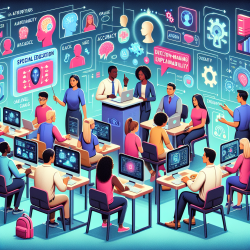As a Special Education Director, you are constantly seeking ways to enhance the educational experiences of students with diverse needs. The integration of artificial intelligence (AI) into educational settings offers promising opportunities to improve decision-making processes. A recent study titled Trading off accuracy and explainability in AI decision-making: findings from 2 citizens’ juries provides insights into how educators can balance the accuracy and explainability of AI systems to benefit special education.
The Balance Between Accuracy and Explainability
The research highlights a critical trade-off between the accuracy of AI systems and their explainability. In healthcare scenarios, participants favored accuracy over explainability due to the direct impact on individual health outcomes. However, in non-healthcare contexts, such as education, explainability was often valued equally or more than accuracy. This insight is vital for educators who rely on AI-driven tools for assessments and personalized learning plans.
Implications for Special Education
- Enhanced Decision-Making: By prioritizing accuracy in certain contexts, educators can leverage AI to make informed decisions about student interventions and support strategies.
- Transparency and Trust: Explainable AI systems can build trust among educators, parents, and students by providing clear reasoning behind decisions, fostering a collaborative environment.
- Personalized Learning: Understanding how AI systems arrive at conclusions allows educators to tailor learning experiences that meet individual student needs effectively.
Practical Steps for Educators
To implement these findings in your practice, consider the following strategies:
- Engage with AI Tools: Familiarize yourself with the capabilities and limitations of AI tools used in your school district. Attend webinars or workshops that focus on AI in education.
- Collaborate with Stakeholders: Work closely with teachers, therapists, and parents to ensure that AI-driven decisions align with educational goals and student well-being.
- Advocate for Policy Development: Encourage school administrators to develop policies that prioritize both accuracy and explainability in AI systems used within the district.
- Pursue Continuous Learning: Stay updated on the latest research and advancements in AI technology through professional development opportunities.
The Role of Online Therapy Services
TinyEYE's online therapy services exemplify how technology can bridge gaps in special education. By integrating AI insights into therapy sessions, therapists can offer more personalized support while ensuring transparency in their methods. This approach not only enhances student outcomes but also addresses therapist staffing shortages by optimizing resource allocation.
In conclusion, embracing the dual benefits of accuracy and explainability in AI systems can transform special education practices. By staying informed and proactive, educators can harness these technologies to create inclusive and effective learning environments for all students.
To read the original research paper, please follow this link: Trading off accuracy and explainability in AI decision-making: findings from 2 citizens’ juries.










